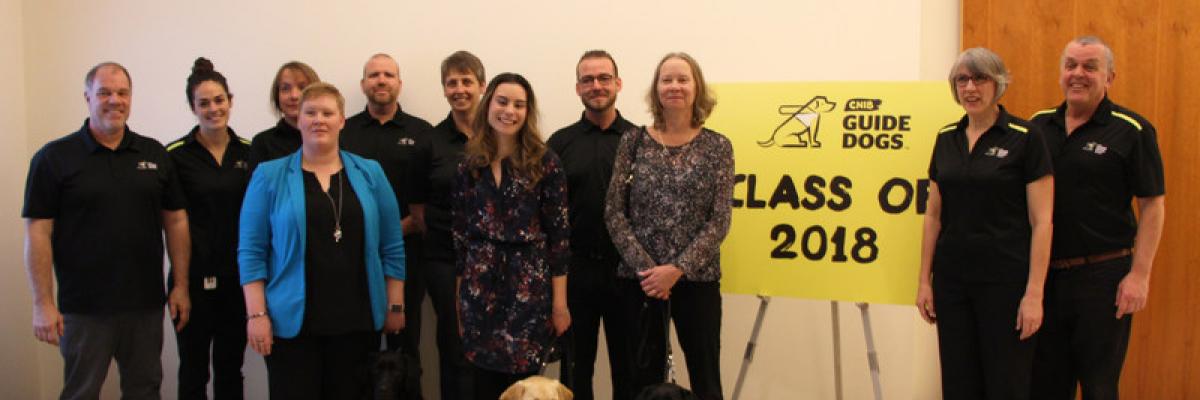Welcome to the December edition of Equalize! In this issue, we celebrate the legal accreditation for CNIB Guide Dogs. We also gain insight into CNIB's response to the Ontario Ministry of Education's "For the Parents" consultation, and we hear from someone with sight loss who participated in a mock evacuation as part of first responder training. Plus, CNIB recommends amendments to the Accessible Canada Act and we learn more about "Smart Cities".
-CNIB Foundation Ontario Advocacy Team
CNIB Guide Dogs receive legal accreditation
In April 2017, we launched CNIB Guide Dogs, a new program to raise and train guide dogs exclusively for people with sight loss, with the range of choices, services and opportunities they need and want.
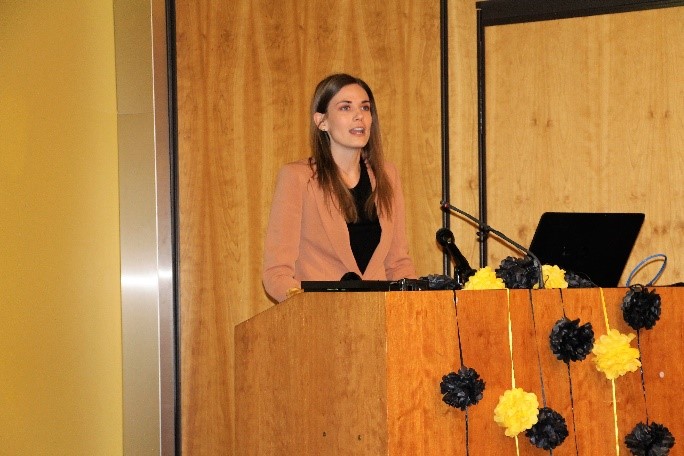 Under the Blind Person's Rights Act 1990, the Ministry of the Attorney General is responsible for accrediting guide dog training facilities in Ontario and issuing an identification card which identifies a blind person and their guide dog as a service animal under law. For the past 18 months, CNIB has been advocating the Ministry of the Attorney General to ensure handlers who receive a guide dog from CNIB are protected from discrimination under law and recognize CNIB Guide Dogs as an accredited guide dog training facility.
Under the Blind Person's Rights Act 1990, the Ministry of the Attorney General is responsible for accrediting guide dog training facilities in Ontario and issuing an identification card which identifies a blind person and their guide dog as a service animal under law. For the past 18 months, CNIB has been advocating the Ministry of the Attorney General to ensure handlers who receive a guide dog from CNIB are protected from discrimination under law and recognize CNIB Guide Dogs as an accredited guide dog training facility.
Under the regulations, the Ministry requires at least one CNIB guide dog to be successfully matched with a handler in order to become fully accredited. On November 23rd, we held a formal graduation ceremony in Toronto to celebrate the successful matches of six guide dogs and their handlers from across the country. The event was attended by Lindsey Park, Member of Provincial Parliament for Durham and Parliamentary Assistant to the Attorney General. We are thankful to the Ministry of the Attorney General for designating CNIB as an accredited guide dog facility and committing to protecting the rights of guide dog handlers in Ontario.
Get involved!
CNIB Guide Dogs is looking for guide dog handlers from across the country who are interested in becoming Guide Dog Ambassadors to advocate and raise awareness about the rights and issues of guide dog handlers. To learn more or express your interest, please email Victoria Nolan, Head, Stakeholder Relations & Community Engagement, CNIB Guide Dogs.
CNIB responds to "For the Parents" consultation
In September, the Ontario Ministry of Education announced it was intending to make changes to the provincial education system (Kindergarten-Grade 12) in several areas. As part of this process, the Ministry issued a consultation, "For the Parents", to get feedback from parents, students, educators and interested individuals or organizations.
 One area that was missing from the Ministry's consultation was how the government can help improve the educational outcomes for Ontario students with special educational needs, including students (K-12) living with sight loss. Even so, all the "For the Parents" topics affect students who are blind or partially sighted. Our community members have voiced their concerns and provided some solutions.
One area that was missing from the Ministry's consultation was how the government can help improve the educational outcomes for Ontario students with special educational needs, including students (K-12) living with sight loss. Even so, all the "For the Parents" topics affect students who are blind or partially sighted. Our community members have voiced their concerns and provided some solutions.
CNIB carried out two province-wide teleconferences, issued an online survey, and consulted with parent groups and advocacy groups. The information from our community consultations has been formally submitted to the Ministry of Education.
Some of the important recurring themes that came out of our discussions included:
- Higher educational and training standards for Teachers of the Visually Impaired (TVI). For detailed briefing on this topic, please refer to VIEW's paper.
- Change the delivery of the Special Equipment Amount (SEA) program to allow parents and students more choices for devices, and freedom to take the device home.
- Adopt procurement practices that mandate mainstream technology in schools and standardized tests are accessible.
You can read the full response on CNIB's website.
If you did not get the chance to provide your input to the "For the Parents" consultation, it's not too late! The consultation closes on December 15th. To give your feedback, visit fortheparents.ca. CNIB will continue to follow up with government officials and community partners to ensure accessible education is top-of-mind for the Government of Ontario.
Taking the next steps in the Re-Vision ADP campaign
According to Statistics Canada, 81 per cent of individuals living with a disability reported using at least one aid/device to assist them in fully participating in society.
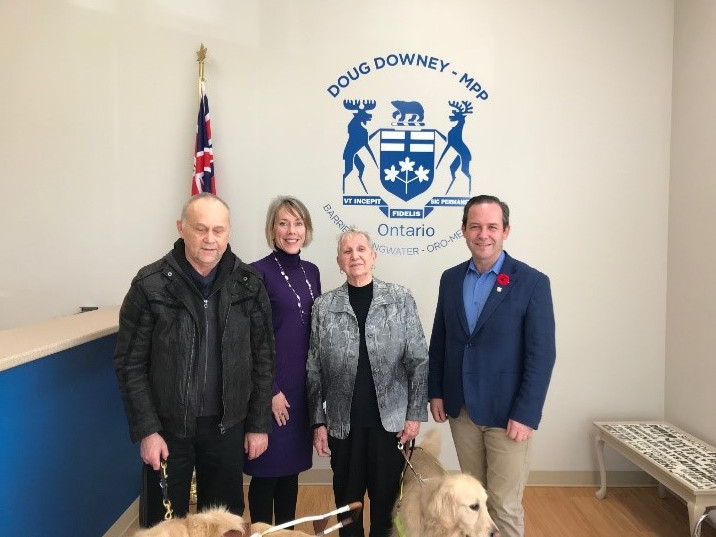 We are asking government officials to meet with the CNIB Group and other stakeholders to discuss how we can work together to modernize ADP. The ReVision ADP Report has been submitted to the provincial government (see ReVision ADP Report: Executive Summary) and CNIB is working with the government and other disability stakeholders on a list of recommendations.
We are asking government officials to meet with the CNIB Group and other stakeholders to discuss how we can work together to modernize ADP. The ReVision ADP Report has been submitted to the provincial government (see ReVision ADP Report: Executive Summary) and CNIB is working with the government and other disability stakeholders on a list of recommendations.
CNIB advocates across Ontario are currently reaching out to MPPs to personally ask them for their support and commitment. So far, meetings with MPPs have been held in the following ridings: Toronto Centre; Parkdale-High Park; Etobicoke Centre; Richmond Hill; and Barrie—Springwater—Oro-Medonte. Advocates are connecting with MPPs in ridings throughout the province.
If you would like to get involved in this campaign, please email advocacy@cnib.ca.
CNIB shares accessible voting survey results with Elections Ontario
As promised in our previous edition of Equalize, CNIB and Elections Ontario (EO) collaborated on an accessible voting survey during the Ontario provincial election to gain a better understanding of the voting experience for people who are blind or partially sighted. Thank you to the 115 people who took the time to respond to the online survey and share their experiences.
 Some highlights from the survey results include:
Some highlights from the survey results include:
- Only 10% of people who responded to our survey used the Elections Ontario website. Some respondents had some specific accessibility feedback for Elections Ontario on improving the usability and accessibility of the website. We heard that some of the information wasn't screen-reader friendly, there were too many drop-down menus and there wasn't a function to edit the contrast, font size, etc. We also heard it was difficult to find phone numbers for returning offices.
- Only 45% of respondents could access the information on their voting card. Respondents felt that you should only need to let your returning office know once that you would like your voting card in an accessible format – your format preferences should be automatically recorded for the future. Respondents also suggested having a tactile marker on the card, receiving it electronically, or by calling a secure automated telephone line and listening to the information.
- The most popular choice (57%) for respondents casting their vote was to have a person assist them, either a companion or a polling clerk.
- Voters had mixed experiences with polling staff. Some had positive experiences, but others had experiences where the staff had a lack of disability awareness (e.g. they spoke to their companion instead of them, and they couldn't give clear verbal cues or share information about accessible voting options.)
- 58% of respondents said they could vote independently, and 77% said they could vote in secret.
In October, CNIB met with EO to present our survey findings and provide recommendations. EO are currently putting together a report to government on all aspects of the election, including accessibility. CNIB and other disability groups will continue to work with EO as they prepare for the next election. EO is planning to host focus groups within the next few weeks – stay tuned!
CNIB launches “Know Your Rights” project
This year, CNIB was awarded a grant by the Law Foundation of Ontario to launch the Know Your Rights project.
Running from now until June 2019, the project will develop plain language legal information resources that will help Ontarians who are blind, partially sighted or Deafblind to better understand their legal rights and challenge discrimination. The project will also train CNIB staff on how to connect clients with legal resources and train legal professionals on how to better accommodate and serve our community members.
To date, we have recruited a diverse, talented team of volunteer lawyers and community advocates – the Know Your Rights “Working Group” – to help guide the project and develop the resources.
At CNIB, the project is led by Avery Au, a lawyer who is excited to share his passion for making legal information more user-friendly and accessible. He is coordinating the efforts of the Working Group and building our network of collaborators, which already includes Community Legal Education Ontario, Ontario Justice Education Network, ARCH Disability Law Clinic and the Human Rights Legal Support Centre.
Throughout the project, we will be reaching out to Ontarians with sight loss and the broader community to receive feedback on our content and learn more. At any time, you can use this online form to suggest a topic for us to write about. Stay tuned for further project updates!
We are still recruiting volunteers with diverse skills and backgrounds to join our volunteer Working Group. To learn more, please email Avery.
Ottawa resident with sight loss takes part in first responder training
On September 12, 2018, a first responder training exercise was held at Lyon Street Station, part of Ottawa's future Light Rail Transit system. Kim Kilpatrick, an Ottawa resident who is blind, participated in the staged evacuation.
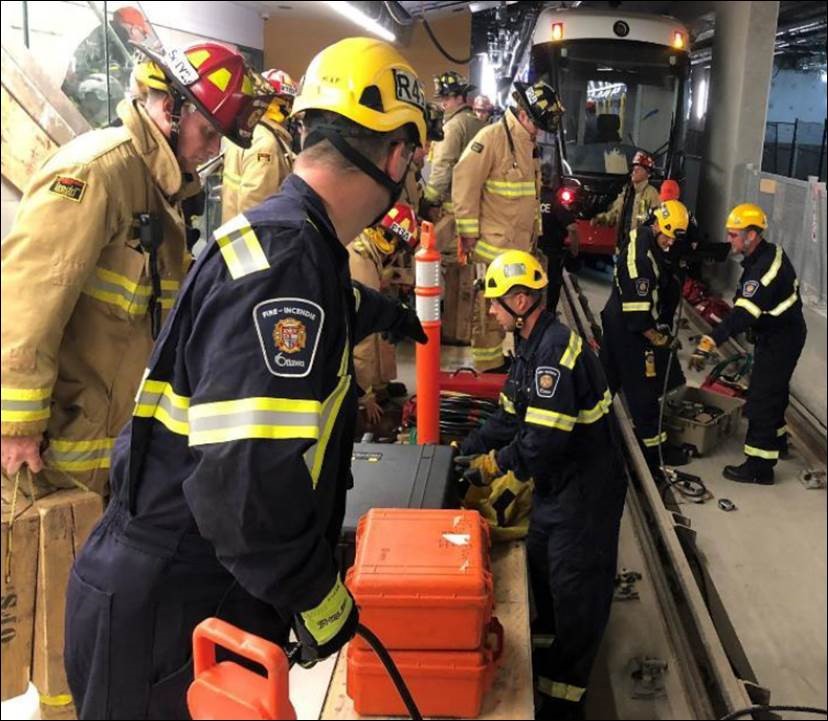 Why did you want to participate in this mock evacuation?
Why did you want to participate in this mock evacuation?
When I heard that the company who facilitated this simulation had never worked with people with disabilities before, I knew that my input could make a difference.
What was the experience like?
The situation was that someone jumped in front of the train while I was standing on the platform. The responder who was assisting me was good about checking in with me every few minutes to let me know what was happening and all the staff were great about describing various details that I couldn’t see. Since I could hear everything and remember it all, I had to give a statement afterward.
Were there any accessibility challenges?
A few. When officials approached me, they didn't identify themselves and I had to ask who they were. Also, the only options for giving a statement were to write it or dictate it to an officer. There wasn't an accessible way for me to write it myself.
What did you learn and/or take away from this experience?
The first responders are effective at their job. A bit more training around working with people who are blind or partially sighted could help, but I felt safe with them.
City of Brantford welcomes wayfinding technology
For people who are blind or partially sighted, navigating unfamiliar environments can be challenging. But wayfinding technologies, such as iBeacons, are enabling people with sight loss to live, work, and play with independence.
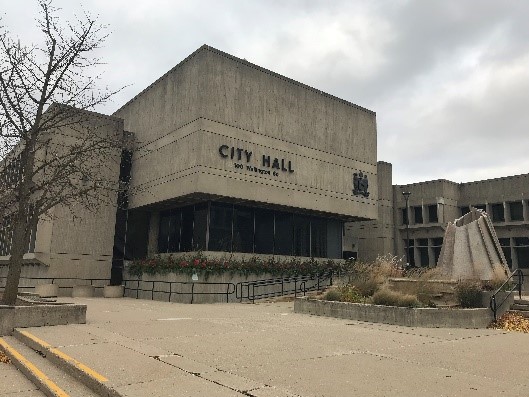 An iBeacon is a small (7cm x 7cm) battery-powered device that silently "communicates" with a smart phone app called BlindSquare, providing the user with a spoken description of their surroundings. This technology allows people with sight loss to navigate more easily and independently and provides valuable information, such as the layout of a shop or business, the location of restrooms, and the availability of goods and services.
An iBeacon is a small (7cm x 7cm) battery-powered device that silently "communicates" with a smart phone app called BlindSquare, providing the user with a spoken description of their surroundings. This technology allows people with sight loss to navigate more easily and independently and provides valuable information, such as the layout of a shop or business, the location of restrooms, and the availability of goods and services.
The City of Brantford is eagerly embracing this technology, welcoming iBeacons at city hall, the civic centre, transit terminal, farmer's market, and the Wayne Gretzky Sports Centre.
City of Windsor explores how transit can operate more effectively
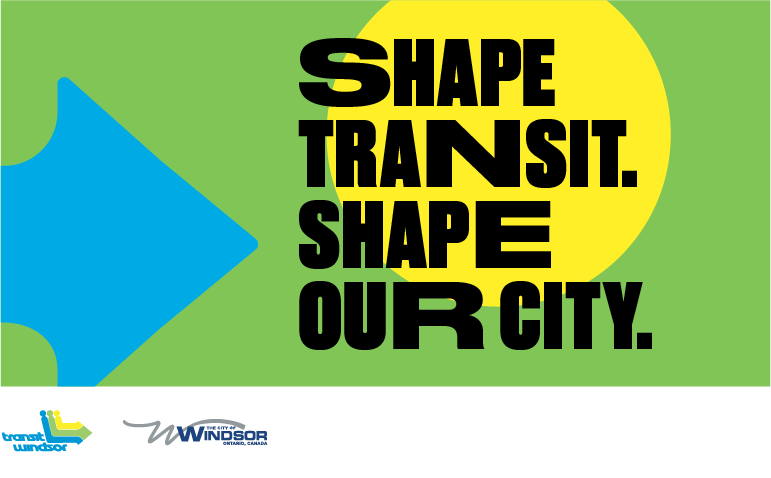 The City of Windsor is exploring how its transit system can more effectively serve the community.
The City of Windsor is exploring how its transit system can more effectively serve the community.
To do this, the City is looking at the changing needs of Windsor. It's looking at how to better connect people to school, work, services, and more. It’s looking at how transit can support the healthy growth and development of our neighbourhoods. It's looking at more than transit.
If you haven't already, share your thoughts through the online survey.
CNIB recommends amendments to the Accessible Canada Act
CNIB has been engaging with the federal government as they study Bill C-81, the Accessible Canada Act. This act aims to break down barriers for Canadians with disabilities. We have engaged in bold advocacy efforts to suggest amendments to Bill C-81 that we feel will strengthen the legislation for Canadians who are blind and partially sighted.
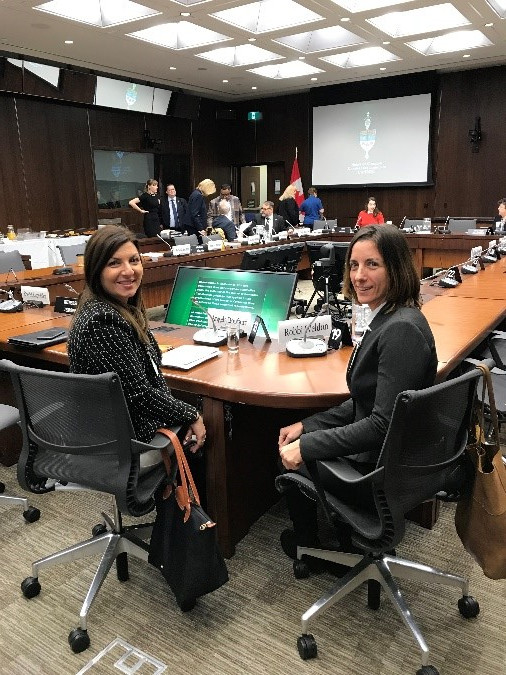 We sent a survey to Canadians who are blind or partially sighted to hear what they thought. Respondents to our survey are generally satisfied with Bill C-81, with 57 per cent having a favourable impression of the Bill. Most of our respondents think the introduction of the Canadian Accessibility Standards Development Organization (CASDO) is the strongest piece of the legislation, followed by the new monetary penalties for accessibility violations.
We sent a survey to Canadians who are blind or partially sighted to hear what they thought. Respondents to our survey are generally satisfied with Bill C-81, with 57 per cent having a favourable impression of the Bill. Most of our respondents think the introduction of the Canadian Accessibility Standards Development Organization (CASDO) is the strongest piece of the legislation, followed by the new monetary penalties for accessibility violations.
Though these parts of Bill C-81 were generally viewed favourably, CNIB received many suggestions for improvement. Almost all the qualitative responses we received had six recurring themes: enforcement, representation, timelines, procurement, processes for complaints, and rights for guide dog users. To learn more, visit the Advocacy section of our website. If you have questions, please email advocacy@cnib.ca.
We used this feedback to inform our recommended amendments and sent copies of our survey analysis and recommended amendments to Members of Parliament from each party. CNIB also appeared before the Standing Committee on Human Resources, Skills and Social Development and the Status of Persons with Disabilities to present our recommended amendments on the Bill. We have been part of this historical legislation from the beginning, and we plan to engage in this process until the Bill receives Royal Assent – and beyond!
World Blind Union identifies "Smart Cities" as international issue
The development of “Smart Cities” is an emerging topic that's capturing the attention of civil engineers, urban planners, architects, municipalities, technology developers, and more. The Smart Cities concept is an emerging issue with embedded concerns, and, an opportunity for individuals with disabilities.
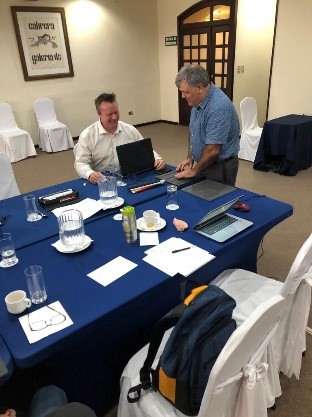
It is important that the perspectives of individuals with sight loss are considered in the development of these urban spaces to ensure conscious and intentional inclusion. Promoting the use of technologies like tactile way marking indicators (TWMI’s), accessible pedestrian signals (APS), iBeacon navigational software (e.g. BlindSquare) and other accessibility platforms, is one way to help ensure inclusion in these modern urban environments.
Lui Greco, Manager, Regulatory Affairs, CNIB and Rob Gaunt, Executive Director, CNIB Foundation Ontario North & West, along with several international experts in the field attended the World Blind Union (WBU) officers meeting in Guatemala City in November. The WBU has identified Smart Cities as one with international scope and impact – it will develop a working coalition to help identify best practices that will enable organizations to engage in conversations about accessibility and inclusivity for their stakeholders.
